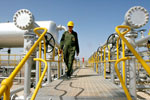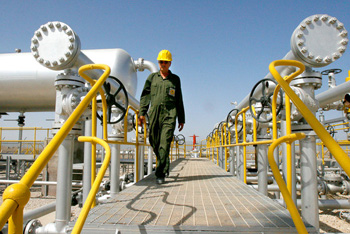 Reuters: Japan’s top oil explorer Inpex Corp may pull out of an oilfield project in Iran, joining other global energy firms in abandoning activities there to avoid U.S. sanctions, trade minister Akihiro Ohata said on Friday.
Reuters: Japan’s top oil explorer Inpex Corp may pull out of an oilfield project in Iran, joining other global energy firms in abandoning activities there to avoid U.S. sanctions, trade minister Akihiro Ohata said on Friday.
 TOKYO Oct 1 (Reuters) – Japan’s top oil explorer Inpex Corp may pull out of an oilfield project in Iran, joining other global energy firms in abandoning activities there to avoid U.S. sanctions, trade minister Akihiro Ohata said on Friday.
TOKYO Oct 1 (Reuters) – Japan’s top oil explorer Inpex Corp may pull out of an oilfield project in Iran, joining other global energy firms in abandoning activities there to avoid U.S. sanctions, trade minister Akihiro Ohata said on Friday.
Inpex, in which Japan’s government holds a 19 percent stake, has not been named either on a list of firms targeted for U.S. sanctions against Iran for its nuclear plans or on another list of firms excluded from the sanctions, Ohata told reporters.
“Inpex is considering things including a withdrawal based on its own management judgement,” the minister said.
“I want to respect their business decision and refrain from interfering in the matter.”
France’s Total, Norway’s Statoil, Italy’s ENI and Royal Dutch Shell have decided to quit their Iranian activities to avoid U.S. sanctions designed to pressure Tehran over its nuclear programme, U.S. officials said on Thursday.
Japan imposed additional sanctions on Iran last month, following the United States and European Union in pressuring Tehran despite Tokyo’s reliance on oil imports from the country.
Inpex has been weighing a withdrawal from the giant Azadegan oilfield project to avoid harming its business. It has a 10 percent stake in the project.
The company would have problems raising funds from U.S. financial institutions and its global development projects could be hindered if it was subject to U.S. sanctions.
Analysts have said a 10 percent stake would allow Inpex to buy up to 50,000 bpd, a small fraction of the nearly 4 million bpd that Japan consumes.
But losing Azadegan would hurt the Japanese government’s efforts to lift the share its companies produce overseas to the equivalent of 40 percent of the country’s oil imports by 2030.
ASIA WATCHES MOVES
Ohata said Inpex was not among companies named as subject to sanctions or among four firms named as not subject to sanctions. “We keep a close eye on the situation. We are relieved that Inpex is not on the sanctions list,” he added.
Japan’s government is the biggest shareholder in Inpex, with an 18.9 percent stake in the trade minister’s name, even after a recent multibillion dollar share sale.
Azadegan was OPEC-member Iran’s biggest oil find in 30 years when announced in 1999, with oil-in-place of 26 billion barrels and recoverable resources then estimated at about 6 billion barrels. It is believed to cost at least $2 billion to develop.
The field started partial output in 2008, with peak production estimated at 260,000 bpd. Inpex has said it has so far invested about 12.4 billion yen ($148.5 million) in Azadegan.
Asked if India’s state-run explorer Oil and Natural Gas Corp would consider a similar move, chairman R. S. Sharma said: “Our view cannot be different from the view of sovereign government, we will go by whatever the government says”.
Junior Indian oil minister Jitin Prasada told lawmakers in August that ONGC Videsh Ltd, the overseas investment arm of ONGC, has been asked to seek a legal view on the impact of U.S. and UN economic sanctions on investment opportunities in Iran. There has been no update on this so far.
ONGC Videsh holds exclusive exploration rights for Iran’s offshore Farsi block. ONGC and Indian Oil Corp each own a 40 percent interest in the Farsi block, and Oil India Ltd holds the rest.
Another ONGC official said the company had the exploration rights and have submitted the report to the Iranians. “They have yet to respond to us, whether we will get the development rights or not.”
Iran has also offered Indian firms a 40 percent stake in the development phase of its largest gas field, the South Pars Phase 12 project, for 6 million tonnes of liquefied natural gas (LNG), but there has been no further progress on this.
India’s Essar Oil Ltd had planned to develop the Azadegan field but abandoned the plan under U.S. pressure.
Spokesmen in China for CNOOC’s listed unit and for CNPC were not immediately available for comment due to a national holiday. China National Petroleum Corp (CNPC), the country’s top energy group, clinched a deal this year to develop phase 11 of the South Pars gas project and expand its operations in Iran.
CNPC is already in a deal to develop Iran’s North Azadegan oilfield into a 120,000-bpd field at a cost of at least $2 billion. China’s Sinopec Group reached a $2 billion deal to develop Iran’s Yadavaran oil field in December 2007.
In Australia, Sydney-based engineering firm WorleyParsons said in August it would no longer accept contract awards in Iran, but stopped short of completely pulling out of the Middle East country.
“WorleyParsons remains vigilant to ensure that it complies with all relevant international trade sanctions,” the firm said in its annual report.
“With regard to projects in Iran, the company has decided not to accept any further contract awards. It will complete existing contracts, subject to ensuring it does not breach any sanctions.” ($1=83.49 Yen) (Reporting by Risa Maeda and Osamu Tsukimori; Additional reporting by Nidhi Verma in NEW DELHI and Rebekah Kebede in PERTH; Writing by Ramthan Hussain; Editing by Michael Urquhart)


